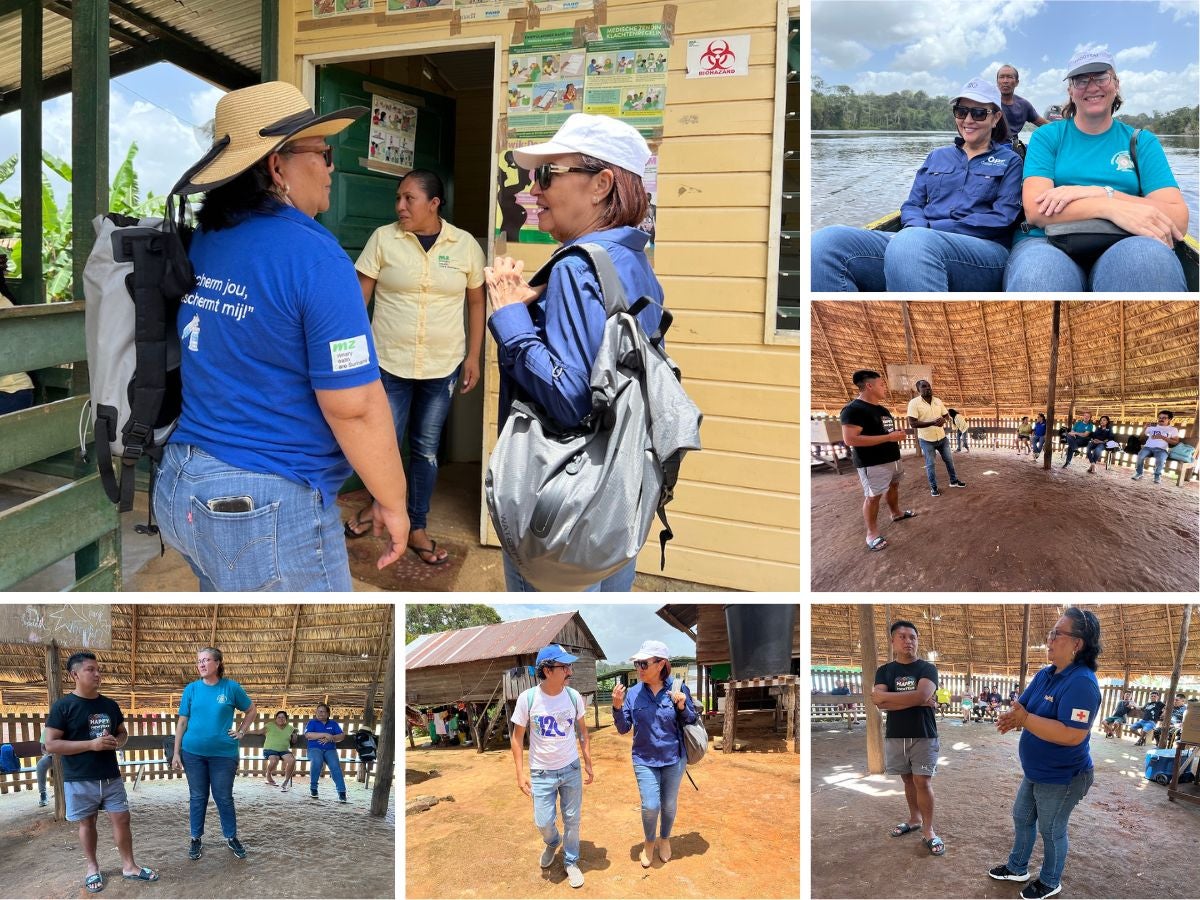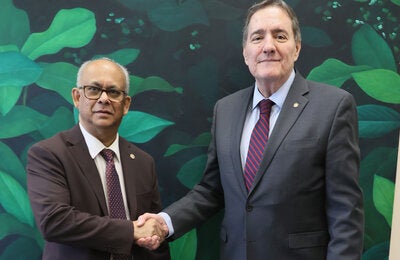
A collaborative effort by the Ministry of Health Suriname, the Malaria Program, Medical Mission, and PAHO/WHO Suriname.
Suriname, April 11, 2023 (PAHO/WHO) – Every year during Easter, the indigenous villages of southern Suriname organize an Easter Conference, where people from nearby villages and surrounding areas come together. This year, the Bible Conference was organized in Apetina. In order to make this gathering safer and healthier for the participants, the Malaria Program / Ministry of Health and the Medical Mission, organized a Proactive Case Detection and malaria outreach in Apetina. This visit was technically supported by the Pan American Health Organization (PAHO/WHO).
Among the PAHO delegates were Dr. Lilian Reneau-Vernon, PAHO/WHO Representative in Suriname, and Oscar Mesones Lapouble, Technical Officer Public Health Emergencies & Tropical and Vector-borne Diseases. Dr. Helène Hiwat, Coordinator of the Malaria Program also joined the Medical Mission delegation led by Maureen Wijngaarde-van Dijk, Deputy Director of the Medical Mission. The site visit aimed to promote awareness and provide information on malaria prevention measures, proactive case detection, and treatment, as well as the distribution of bed nets to reduce the risk of infection.
During the site visit, a session for discussions and decision-making on matters that affect the village and its people with the village, also known as a “Krutu”, was held to promote community engagement and mobilization for malaria prevention and control, and to ensure that everyone is aware of the risks associated with the disease and the measures they can take to protect themselves and their families.
In recent years, the Krutu has also become an opportunity to raise awareness about health issues affecting the community, particularly malaria. The Ministry of Health, Suriname, and other health organizations have been using this event to conduct health outreach activities and provide education on malaria prevention and control.
The village leader (in Surinamese: Basja) opened the Krutu by expressing her gratitude for the support provided to the local community, specifically the health outreach activities and the education on malaria prevention and control provided by the Ministry of Health, the Malaria Program, Medical Mission, PAHO/WHO and other health organizations. Dr. Lilian Reneau-Vernon, who came to Suriname for the first time in February 2023 mentioned that this was a great first field visit in order to see the area and meet these important members of the Amerindian community and witness the work being done by the local healthcare professionals.
Maikel Fede, the Focal Point for Malaria at the Medical Mission, emphasized the importance of adhering to the health and safety guidelines and agreements that have been established between the traditional authorities of each indigenous village. He explained that visitors from outside the villages are required to undergo malaria screening as a precautionary measure.
As part of the measures to prevent transmission of malaria during the Easter Conference in Apetina, all attendees will undergo a mandatory screening procedure. The screening process involves a finger-prick blood test, which will be analyzed using a microscope, with the results being available immediately. The purpose of this screening is to not only prevent the transmission of malaria within the conference but also to prevent the importation and exportation of malaria to and from other villages and regions. This is especially critical as Suriname is aiming malaria elimination, and it is imperative to take all necessary precautions to prevent another outbreak.
In an effort to combat the risk of reintroduction of malaria in Suriname, the Malaria Program is taking proactive steps to educate the younger generation on the importance of malaria prevention. As Dr. Hiwat, the Coordinator of the Malaria Program, pointed out, the success of malaria elimination in Suriname has led to a lack of knowledge and awareness of the disease among the population, particularly the youth, as the younger generation has never experienced malaria and there is a risk of reintroduction from imported cases.
The outbreak in two indigenous villages in 2019 and 2020 served as a stark reminder of the dangers of malaria and highlighted the need for education and prevention measures, as it became apparent that the knowledge and awareness of malaria prevention measures had significantly decreased among the population. It is crucial to ensure that people are aware of the risks and necessary actions to take, especially since imported cases can easily reintroduce the disease to the population.
This poses a significant danger to the community as people are not aware of the risks and necessary actions to take. To address this issue, efforts are being made to educate the youth on what malaria is, its impact on Suriname in the past, and how to prevent it
To this end, the Malaria Program is also developing children's booklets in multiple languages, including Dutch and various indigenous languages spoken in Suriname. These booklets are designed to educate children between the ages of eight and twelve on what malaria is, how it has impacted Suriname in the past, and what can be done to prevent it.
By teaching the younger generation about malaria prevention and awareness, the Malaria Program hopes to create a culture of vigilance and prevention in Suriname. With continued efforts and a focus on education, it is possible to eliminate malaria in Suriname.




